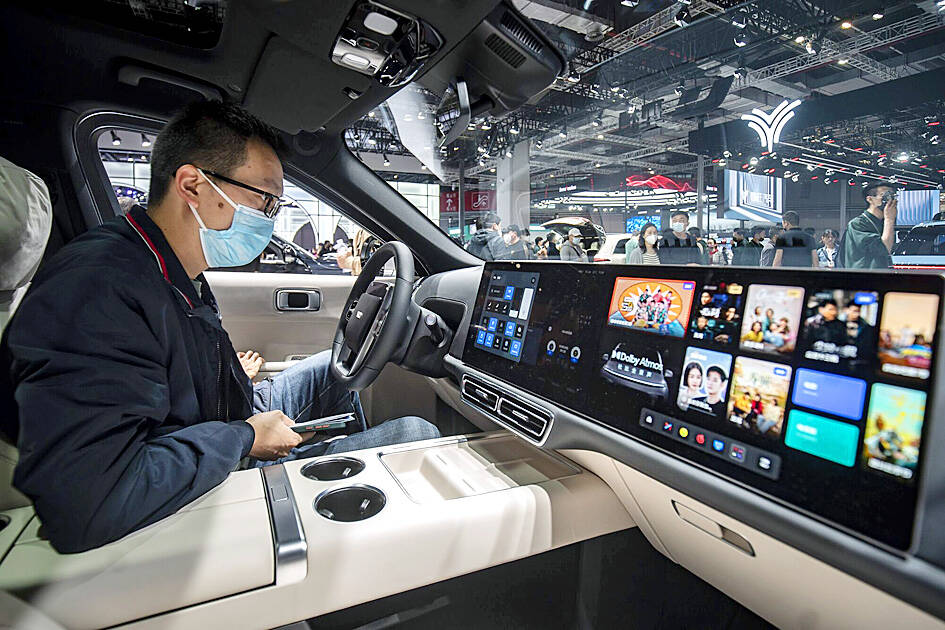Shares of Chinese electric vehicle (EV) maker Li Auto Inc (理想汽車) have more than doubled from last year’s low and are tipped for further gains even as a slowing economy and price war hamper its rivals.
The Beijing-based automaker unexpectedly reported profits for the past two quarters by churning out a regular lineup of new models and keeping costs contained.
Analysts remain bullish: Citigroup Inc predicts the firm’s shares would climb another 88 percent by the end of the year, while Morgan Stanley raised its price target by more than 40 percent this month.

Photo: Bloomberg
Li Auto has outpaced its peers by introducing a new model in each quarter since the middle of last year, much faster than competitors such as XPeng Inc (小鵬汽車) and Nio Inc (蔚來汽車). The revamped product lineup helped revenue surge by 96 percent last quarter, while deliveries rose to a record 52,584.
“The order intake has been much stronger than the market had expected, thanks partly to the intensive model launches,” said Joanna Chen, an analyst at Bloomberg Intelligence in Hong Kong. “Li Auto’s sales volume will continue to beat XPeng and Nio this year, as the latter are still in a phase of product switch.”
Li Auto’s Hong Kong-listed shares closed at HK$112 yesterday, having climbed from last year’s low of HK$53.55 set on Oct. 31. Their 109 percent rally over the period compares with a 23 percent gain in Xpeng, and a 19 percent loss for Nio.
A price war is heating up in China’s EV industry as the costs of batteries fall from last year’s highs. Tesla Inc and BYD Co (比亞迪) have both announced plans to cut vehicle prices, effectively squeezing industry margins, although analysts see Li Auto ideally positioned to weather the intensifying competition.
The price wars are mainly in the mass-market segment around a selling price of 100,000 yuan to 150,000 yuan (US$14,122 to US$21,183), “but Li Auto is selling cars far above that range,” said Vincent Sun, an analyst at Morningstar Asia Ltd in Singapore. “Secondly, if you look across the board, there are actually not too many models to choose in mid-to-large-sized premium SUVs [sport utility vehicles].”
Unlike its rivals, Li Auto has focused on designing and manufacturing extended-range electric vehicles, which use gasoline engines to add to the distance possible for their electric motors.
The company is also expected to introduce its first purely electric-powered vehicle later this year to complement its existing range of hybrid cars.

Taiwan Semiconductor Manufacturing Co (TSMC, 台積電) last week recorded an increase in the number of shareholders to the highest in almost eight months, despite its share price falling 3.38 percent from the previous week, Taiwan Stock Exchange data released on Saturday showed. As of Friday, TSMC had 1.88 million shareholders, the most since the week of April 25 and an increase of 31,870 from the previous week, the data showed. The number of shareholders jumped despite a drop of NT$50 (US$1.59), or 3.38 percent, in TSMC’s share price from a week earlier to NT$1,430, as investors took profits from their earlier gains

In a high-security Shenzhen laboratory, Chinese scientists have built what Washington has spent years trying to prevent: a prototype of a machine capable of producing the cutting-edge semiconductor chips that power artificial intelligence (AI), smartphones and weapons central to Western military dominance, Reuters has learned. Completed early this year and undergoing testing, the prototype fills nearly an entire factory floor. It was built by a team of former engineers from Dutch semiconductor giant ASML who reverse-engineered the company’s extreme ultraviolet lithography (EUV) machines, according to two people with knowledge of the project. EUV machines sit at the heart of a technological Cold

Taiwan’s long-term economic competitiveness will hinge not only on national champions like Taiwan Semiconductor Manufacturing Co. (TSMC, 台積電) but also on the widespread adoption of artificial intelligence (AI) and other emerging technologies, a US-based scholar has said. At a lecture in Taipei on Tuesday, Jeffrey Ding, assistant professor of political science at the George Washington University and author of "Technology and the Rise of Great Powers," argued that historical experience shows that general-purpose technologies (GPTs) — such as electricity, computers and now AI — shape long-term economic advantages through their diffusion across the broader economy. "What really matters is not who pioneers

TAIWAN VALUE CHAIN: Foxtron is to fully own Luxgen following the transaction and it plans to launch a new electric model, the Foxtron Bria, in Taiwan next year Yulon Motor Co (裕隆汽車) yesterday said that its board of directors approved the disposal of its electric vehicle (EV) unit, Luxgen Motor Co (納智捷汽車), to Foxtron Vehicle Technologies Co (鴻華先進) for NT$787.6 million (US$24.98 million). Foxtron, a half-half joint venture between Yulon affiliate Hua-Chuang Automobile Information Technical Center Co (華創車電) and Hon Hai Precision Industry Co (鴻海精密), expects to wrap up the deal in the first quarter of next year. Foxtron would fully own Luxgen following the transaction, including five car distributing companies, outlets and all employees. The deal is subject to the approval of the Fair Trade Commission, Foxtron said. “Foxtron will be